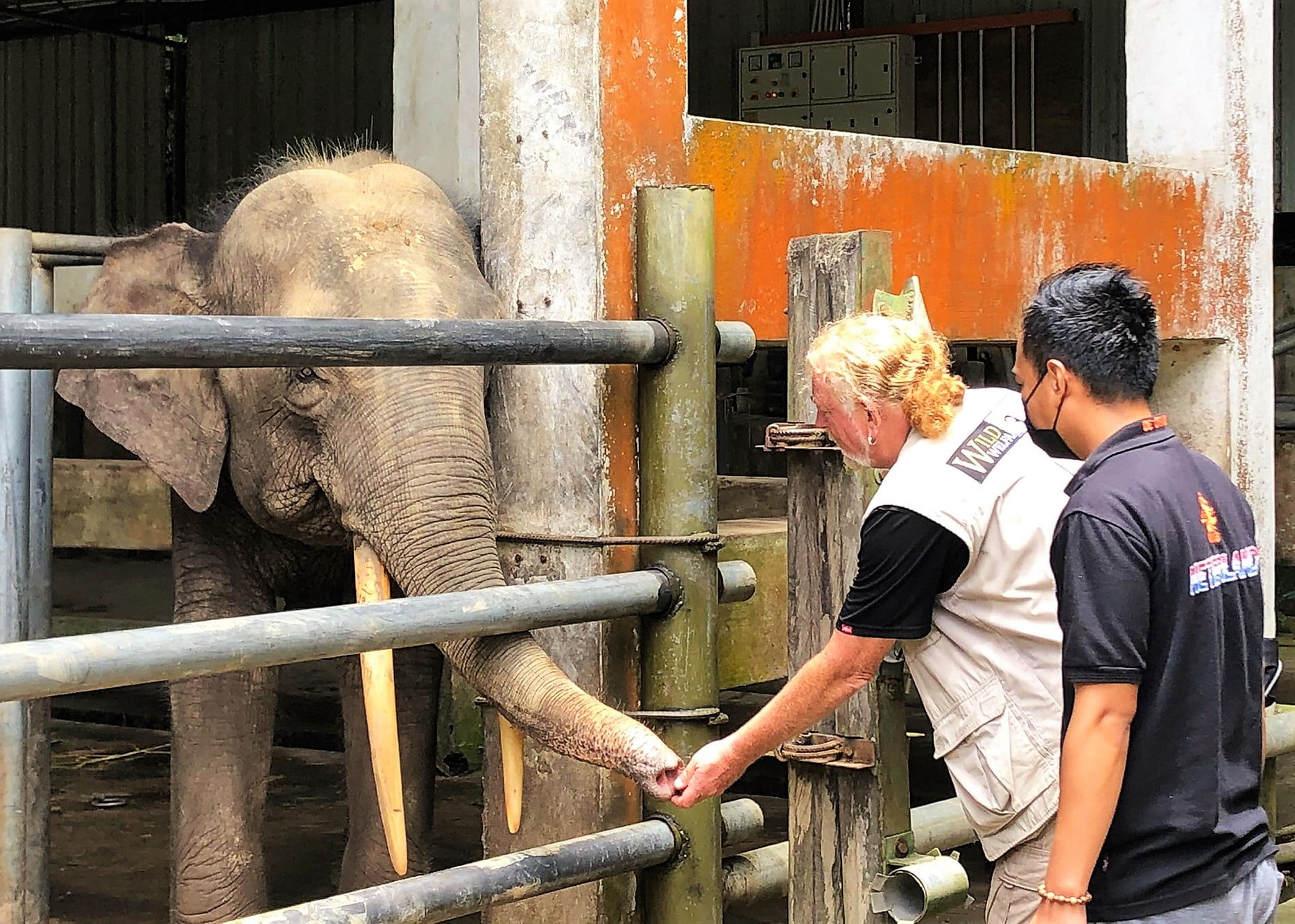Welfare Progress for Captive Animals in Sabah
After two years, the Wild Welfare team were finally able to return to in-person, hands-on international projects again, with a visit to Lok Kawi Wildlife Park in Sabah, and a particular focus on elephant welfare.
Thanks to financial support from The Elephant Sanctuary in Tennessee, Wild Welfare’s Field Director Dave Morgan and Margaret Whittaker from Creative Animal Behaviour Solutions journeyed to Sabah in March after several postponements due to the global pandemic.
The initial aim of the visit was to conduct reviews on Lok Kawi’s elephant facilities which will instigate welfare improvements. These could include changes to the elephant enclosures to create a better, more comfortable home which is more elephant appropriate, as well as potential nutritional changes to ensure the elephants have a healthy diet. The opportunity to socialise and interact with other elephants is also important therefore management changes to encourage this will result in happier individuals. Giving the elephants choice and control over their lives and how they interact with their environment and each other is critical in allowing the elephants to thrive. By working with our partners, Wild Welfare can help make the changes needed to give the elephants a better standard of living.
During previous visits to the park, the team conducted welfare audits and training workshops with elephant care staff and made recommendations for improvements in management techniques. These included discussions on the initiation of a fully protected contact system for the 15 elephants residing at the facility.
Protected contact is a system for managing elephants that uses positive reinforcement training as the primary method to modify behaviour. Voluntary cooperation of the animal is gained through the use of rewards, and positioning is directed by targets with trainers functioning outside of the elephant social hierarchy.
Strategies to modify the enclosure and holding areas to facilitate protected contact management and ongoing welfare improvements were put together during the visit.
However, obvious improvements to overall elephant husbandry and welfare standards since the previous visit were noted. Several individual elephants had been moved out of the off-exhibit holding into the main enclosure, reducing the number of elephants being maintained off-exhibit to only four. These individuals had also been provided with piles of a sand/soil mix on top of the concrete floor of the holding enclosures, and various enrichment items to interact with. Substrate piles like this give elephants the opportunity to express important behaviours such as dust bathing whilst also providing a soft and comfortable place to sleep.
“It was enormously gratifying to see the positive changes which had occurred following our previous visit. The team had clearly listened to what we had discussed and acted on our recommendations.” Dave Morgan, Wild Welfare’s Field Director.
Dave also had the opportunity to catch up with an old friend named Ganesh, a 14-year-old bull elephant. During the previous visit, Ganesh had astounded and deeply moved Dave.
“Ganesh had been watching us target training two of the other younger bulls. He caught my attention and I offered him the target and he responded appropriately immediately. He had learnt to do that purely from watching us with the other elephants. It was a profound moment,” he recalls.
Both Dave and Margaret were very pleased with the progress made by both the elephants and their care-givers.
“It was clear to us that the elephant staff and the elephants themselves had been continuing to practise what we had taught them during the last visit,” said Margaret.
Following additional recommendations made by the team during the previous visit in 2019, the binturongs – which had been previously housed individually in small, off-exhibit, wooden hutches – had all been moved together, into a single, large and spacious enclosure, allowing them the opportunity to explore and express natural behaviours. The two Sumatran clouded leopards were also noted to have lost some weight following concerns in 2019 regarding their diet and obesity.
Further return trips are planned for this year to implement additional training with the elephants. The programme also includes the opportunity for two Lok Kawi staff members to travel to The Elephant Sanctuary in Tennessee and learn directly from their experienced team in protected contact management practices.
Wild Welfare currently works in over 10 different countries, driving forward animal welfare improvements for captive animals in zoos, aquariums, and sanctuaries. The charity is currently celebrating it’s 10 year anniversary, and initially began working in Sabah in 2016.
~ENDS~
Notes to Editors
For more information or interview requests please contact Wild Welfare on communications@wildwelfare.org
Wild Welfare is a global organisation committed to improving animal welfare for captive wild animals. By uniting the world’s leading zoos, zoo associations and animal welfare organisations, we build trusting partnerships that help provide long-term solutions to critical wild animal welfare issues.
Our vision is to end the suffering of captive wild animals around the world and ensure full and sustainable protection is given to all animals in human care. Find out more at wildwelfare.org. Registered charity in England (no.1165941).





